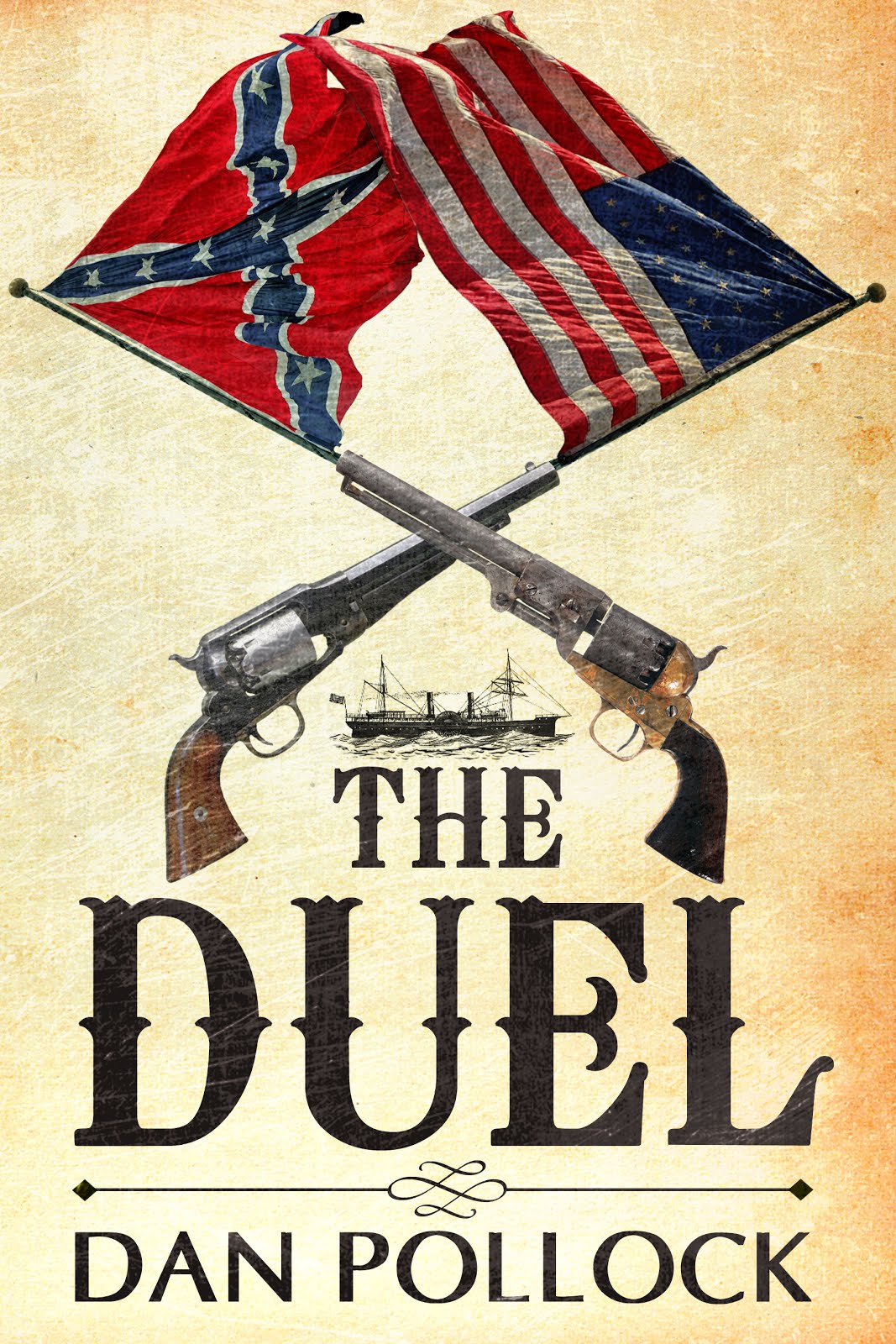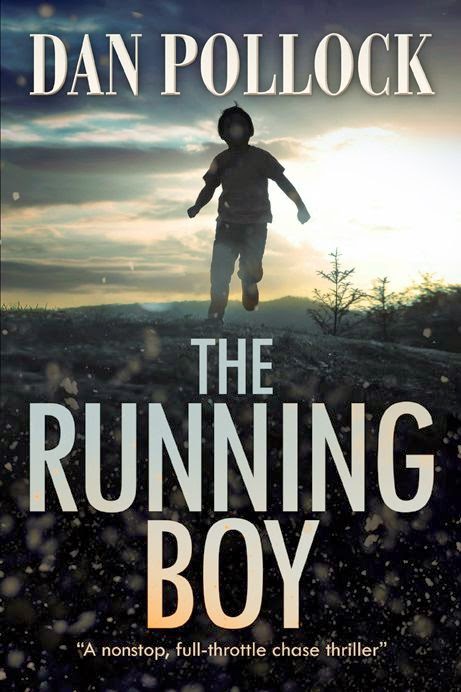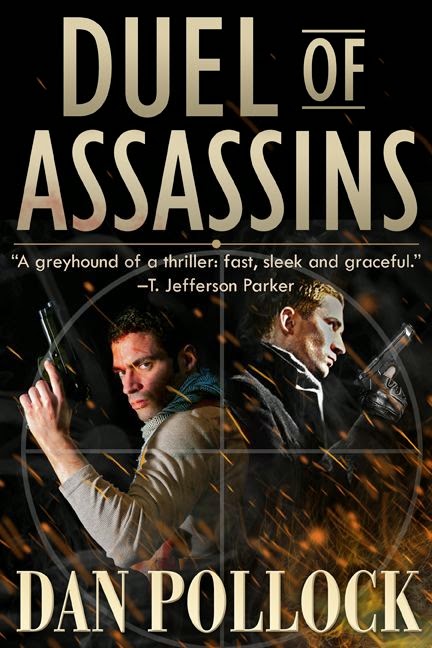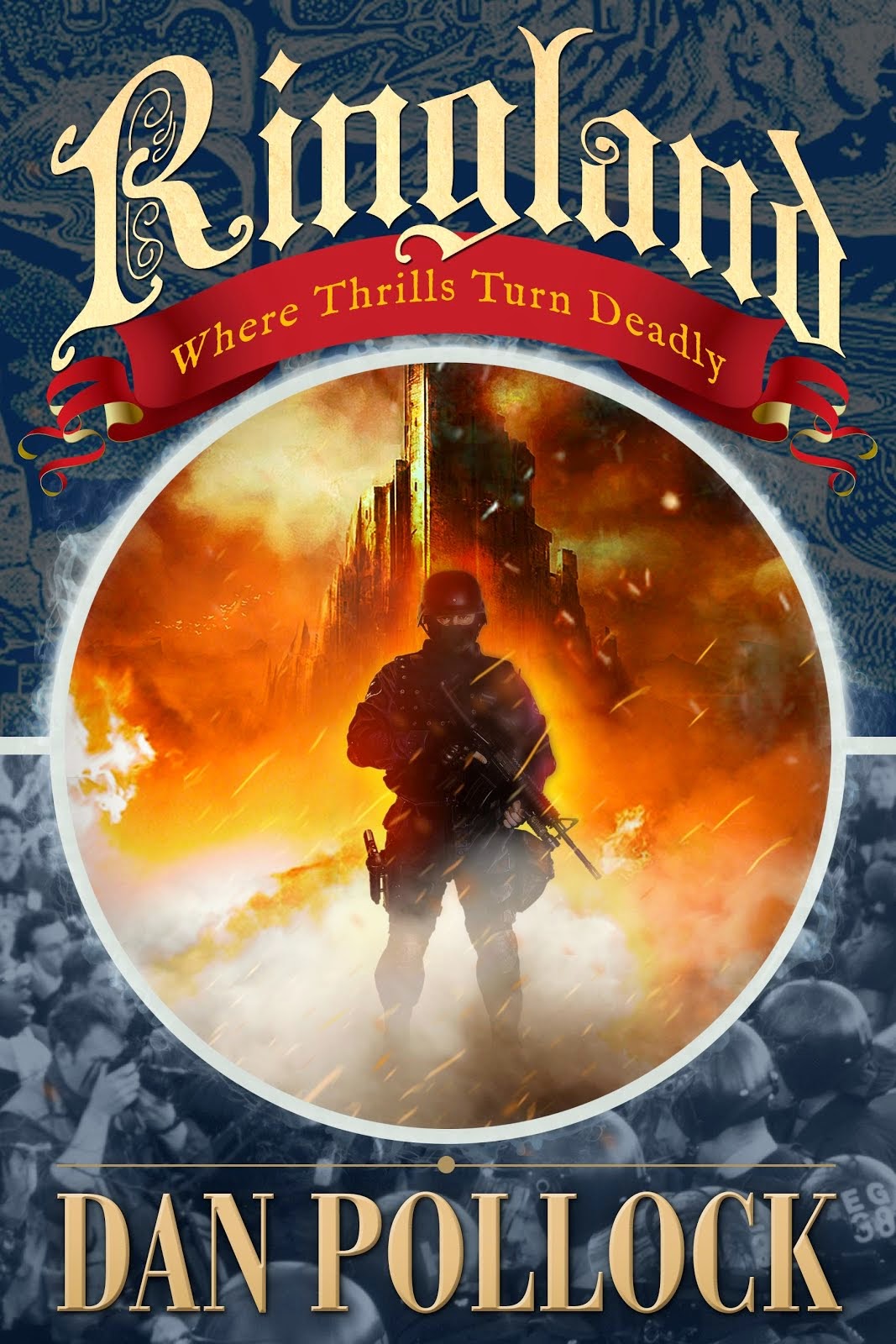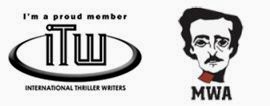On his website, T.S. O’Neil reprints a review that describes his “action-packed crime novels” Tampa Star and Starfish Prime as artful blends of “Fifties detective noir with modern-day high-tech suspense.” I agree, but when I speed-read the opening chapters of Tampa Star, I was reminded as well of Elmore Leonard—that is, I was hearing the unique voices, not of a writer, but of unforgettable characters. I was thus pleased to discover, as you will see, that O’Neil lists Leonard as one of the writers who have most influenced him.
 |
| Author T.S. O'Neil |
Pollock: So what do I call
you? T.S.?
O’Neil: Please call me Tim.
Pollock: Okay, Tim, let me
start with a compliment. I was carried away by the unique narrative power in Tampa Star—the first book of the
Blackfox Chroncles. It didn’t feel like reading so much as leaning back in a patio
chair with a Corona or a Dos Equis in hand while listening to hilarious war
stories told. In appropriate social circumstances, are you a natural raconteur?
O’Neil: First of all, I
don’t know what that means. Just kidding—and I sincerely appreciate the
compliment. I’m an introvert with extroverted tendencies that are normally
fueled by alcohol. They had guys in Ranger School they called “Spotlight Rangers”
who were candidates who only performed while in the spotlight; otherwise they
hung back and marshaled their resources. I guess you could call me a spotlight
raconteur. In social situations, I try a few trial balloons to see if anyone
gets my humor and take it from there. As for the humor in both books, I think
that the military is full of frustrated comedians. If you think about it, they
are often deployed to austere locations among a group of like-minded
individuals and are often stymied by circumstances. Their frustrations are
caused or fueled by the stupidity of the officers or NCOs above them, and
because they are thrust into a truly shitty situation. Relief comes either from
laughter or craziness. I have to say, though, that of all the services, I think
the Marines are the funniest and usually the most politically incorrect as the
ratio of men to women is the highest of all the services.
Pollock: To capture that
conversational style, have you ever thought of just talking your story into a
microphone, then transcribing and editing later?
O’Neil: No, but I may give
it a try.
Pollock: Do you keep a file
of choice and colorful anecdotes from your years in the military?
O’Neil: No, I wish I had, but
there are lots of stories out there. The anecdotes about snipers and Explosive
Ordinance Disposal are the funniest as they are darkest. Sayings like: “Never
start a fight with a man who can end it from another ZIP code,” referring to a
sniper with a 50-caliber sniper rifle. Or, referring to an EOD technician
failing to defuse a bomb: “If you see me running, try to keep up.” are just a
couple of offhand
So all of these amateur comedians in uniform have a lot of material
to work with, based mostly on the stupefying ridiculousness of the huge
bureaucracy that is the U.S. military. They are given lots of material, but
little freedom to use it; hence the frustration. I try and imagine what would
accurately be said in humor to mask the occurrence of a bad event.
Someone once said that war is interminable boredom punctuated by
moments of terror. An active imagination is what keeps you in good spirits and
helps you fill the void or salve your fear. I bet King Leonidas was an
especially funny guy to be able to crack wise when confronted by hundreds of thousands
of Persian soldiers. His “Come and get them!” [in reply to the Persian
ultimatum to lay down his weapons] is, if not the first badass line in history,
maybe the best known.
Pollock: Your impressive
military and law enforcement background obviously makes you a natural for the techno-thriller
genre. Who are your favorite thriller writers?
O’Neil: I really can’t
agree on the impressiveness of my military background. As a careerist, I was an
abject failure as I was always in the wrong place at the wrong time. Meaning
wherever I happened to be, peace was breaking out like mad. I was supposed to
jump into Omar Torrijos Airport with the Rangers during Operation Just Cause,
but instead I went on to the MP Officer Advance Course. The invasion took place
in December of ’89; as I drove home to Connecticut for Christmas break, members
of my former unit parachuted into glory. Later, as I sat in Panama enjoying the
new era of peace and prosperity, Operation Desert Storm took place. My luck
finally caught up with me and I spent part of a tour in Iraq. Other than a
couple of nights of rocket fire, the period in Iraq was relatively peaceful.
Additionally, I’m a freedom-loving individual and although servicemen defend
freedom, they have very little of it inside their ranks. And as you probably
noticed by know, I pretty much say what’s on my mind, which is not particularly
career-enhancing. The bottom-line is that I was just a guy wanting to see the
world on the cheap, but… what was your question again? Oh, yes, favorite
thriller writers.
Well, you’re certainly a favorite author as of late. I loved The Running Boy and thought Duel of Assassins was particularly well
done. But having said that, I have some pretty esoteric tastes when it comes to
thrillers. Laurence Shames is a favorite, because he has quirky characters and
writes in the Florida Glare genre. I can forgive him for being a bit of a
liberal because I like his writing. Elmore Leonard, may he rest in peace, is a
personal favorite. His writing and success taught me to believe that you can
and should try to write  the way people speak. People are funny and they say
lots of humorous things, even in tense situations. He famously said, “Try to
write what people want to read and leave the rest out.” Leonard labored in relative
obscurity for most of his career and finally found some level of acclaim after
Hollywood discovered him by basing movies on Get Shorty, 3:10 to Yuma and Jackie
Brown.
the way people speak. People are funny and they say
lots of humorous things, even in tense situations. He famously said, “Try to
write what people want to read and leave the rest out.” Leonard labored in relative
obscurity for most of his career and finally found some level of acclaim after
Hollywood discovered him by basing movies on Get Shorty, 3:10 to Yuma and Jackie
Brown.
 the way people speak. People are funny and they say
lots of humorous things, even in tense situations. He famously said, “Try to
write what people want to read and leave the rest out.” Leonard labored in relative
obscurity for most of his career and finally found some level of acclaim after
Hollywood discovered him by basing movies on Get Shorty, 3:10 to Yuma and Jackie
Brown.
the way people speak. People are funny and they say
lots of humorous things, even in tense situations. He famously said, “Try to
write what people want to read and leave the rest out.” Leonard labored in relative
obscurity for most of his career and finally found some level of acclaim after
Hollywood discovered him by basing movies on Get Shorty, 3:10 to Yuma and Jackie
Brown. Another great author I admire is Norman Mailer, but for different
reasons. He managed to write a really twisted thriller called Tough Guys Don’t Dance and also wrote
the script for the movie of the same name. The protagonist, played by Ryan
O’Neal, is watching his world crumble all around him—his wife leaves him, he
can’t stop drinking and lastly, there are two heads in a bag in the basement
and he is left trying to figure out how they got there. I used to watch the
movie when my life was at a low point and it would allow me to think, well, at least I don’t have it as bad as
that guy. I believe the movie bombed, but the script closely followed the
book and I liked that.
Another great author I admire is Norman Mailer, but for different
reasons. He managed to write a really twisted thriller called Tough Guys Don’t Dance and also wrote
the script for the movie of the same name. The protagonist, played by Ryan
O’Neal, is watching his world crumble all around him—his wife leaves him, he
can’t stop drinking and lastly, there are two heads in a bag in the basement
and he is left trying to figure out how they got there. I used to watch the
movie when my life was at a low point and it would allow me to think, well, at least I don’t have it as bad as
that guy. I believe the movie bombed, but the script closely followed the
book and I liked that.  Pollock: You’re quoted as
saying you “write about heroes with a few chinks in their armor.” In fact, your
father-and-son duo, ex-Green Beret Char Blackfox and his Recon Marine son,
Michael Blackfox, seem to function best just a half-step ahead of the law. Can
you tell us a little about how you fleshed them out?
Pollock: You’re quoted as
saying you “write about heroes with a few chinks in their armor.” In fact, your
father-and-son duo, ex-Green Beret Char Blackfox and his Recon Marine son,
Michael Blackfox, seem to function best just a half-step ahead of the law. Can
you tell us a little about how you fleshed them out?
O’Neil: Inspiration for the character of Char Blackfox, the main
protagonist in Tampa Star and Starfish Prime, came from various
places. I was looking for someone memorable and at the time I attended a
Battlefield Walk on the Loxahatchee River in South Florida. In 1838, the
Seminoles fought two pitched battles against the U.S. Army. By all accounts,
the first battle was a rout of the federal troops, as the indigenous people
occupied the high ground—including having talented sharpshooters among the
branches of ancient cypress trees. The Seminole were also experienced warriors
with access to comparable weaponry as their foes, who were the usual mix of
conscripts and seasoned veterans. More importantly, the federal troops were
exhausted after having spent months on the trail in a forced march from
Georgia. So, after hearing about the fierce Seminole warriors, I decided to
make them the inspiration for Char Blackfox.
However,
the incident that caused Char’s leg injury was based on a real event that
happened to an old buddy of mine, a Korean American platoon sergeant I served
with while assigned to a Military Police Company in the Republic of Korea. In
Tampa Star, Char was wounded by a dead enemy soldier in Vietnam. This actually
happened to the platoon sergeant in almost exactly the same fashion while he
was serving in the 101st Airborne deployed to Vietnam. The platoon sergeant
nearly lost a leg because he shot and killed the enemy soldier, who was trying
to infiltrate the company’s defensive perimeter. My buddy then pulled the rifle
away from the dead man while his lifeless but still flexed finger still enveloped the
trigger. The platoon sergeant was shot in the leg and had to be reclassified as
an MP because he was no longer fit enough to serve in the infantry.
So—Char
Blackfox is a composite character based on a lot of old soldiers and Marines I
knew when I was first finding my footing in the military. His son Michael was introduced as a way to bring the novel into present
time. I wanted them to play off each other—the old guy versus the young buck. I
thought the unique father-son Semper Fi bond was a rich area to mine.
Pollock: Among your many
5-star Amazon reviews there’s one 3-star that faults your heroes for stereotypical
macho behavior and attitudes toward women. So—are you planning to send the
Blackfox boys to politically correct reeducation camps and neuter them into Low-T
metrosexuals?
O'Neil: I think General
James N. Mattis, former Commandant of the Marine Corps, said it best: “When you
men get home and face an anti-war protester, look him in the eyes and shake his
hand. Then, wink at his girlfriend, because she knows she's dating a pussy.”
If that particular reviewer wants to live in that politically
correct world, she should go find that war protestor, as I heard he’s looking
for a girlfriend. To quote someone else, “Life is hard and it’s harder if
you’re stupid.” I believe that’s from The
Friends of Eddie Coyle, but I digress. The most important thing to me is
that I write realistically—if that makes some people, especially those on the
left of the political spectrum queasy, that’s a bonus.
Pollock: Glad to hear it! One
of the things that makes your books so much fun is that they’re almost P.C.-free.
In fact, Char and Michael Blackfox take me back to the door-busting pulp heroes
of my youth—hard-drinking, skirt-chasing private eyes like Mickey Spillane’s
Mike Hammer or Richard Prather’s Shell Scott, and Donald Hamilton’s randy
superspy, Matt Helm. Nowadays, no doubt, Ian Fleming’s “M” would be pressured
to send 007 to the first available sexual harassment workshop.
O’Neil: Yeah, all of those
authors and characters have been an inspiration to me, whether I knew it or
not. I’m so sick of the new metrosexual action heroes and apparently so are a
lot of other folks, as evidenced by the success of certain characters in film
and literature. I mean Adrien Brody as the star of the last Predator film? John Wayne must be
turning over in his grave.
The first James Bond played by Sean Connery was a case study in political
incorrectness, and the character went downhill after he left, until Daniel
Craig managed to redeem him somewhat. Another character that probably would not
be such a success today is John McLane, the hero played by Bruce Willis in the
Diehard series.
Michael Blackfox does get a serious love interest in Mudd’s Luck, but he’ll stay largely the
same as in past books. Char can’t change as he’s a dinosaur and necessary at
certain junctures to shake up the narrative. I’m in the process of bringing
back other characters because after I finish ML, Michael and Char deserve a little respite.
Pollock: I like to ask techno-thriller
writers how they stay current on military hardware and geopolitics. Do you have
any favorite online sources you can share (without betraying too many trade
secrets)?
O’Neil: My final deployment
allowed me to become current on lots of new weaponry and other hardware, and I
included some of it in both books. I’ve also rubbed shoulders with lots of
special ops types and actually served in a unit within that command for a
while, although I’ve never claimed to be a true “snake eater.” During my time
in the Marines and in Special Operations, I learned enough about how certain
special ops units like the SEALs, Force Recon, Army Rangers and Special Forces
operate and researched a lot more to write accurately and realistically about
that particular subgroup. You can pretty much Google anything. As far as
approaching special ops types, you really have to be careful. If they are still
on active duty, you might as well forget talking to them, and the guys who have
been out for a while may not be as in the loop as they claim. I look to
websites and boards from time to time. There are lots of unofficial special ops
bulletin boards that you can find through various search engines, such as Level
Zero Heroes, which is about a Marine Special Operations Team.
Pollock: What about experts
you call on? Tom Clancy cultivated a grapevine that linked him to what he
called the “Great Chain,” a network of military types, government employees and
intelligence officers who fed him information. Do you have a similar brain
trust of ex-military you check with?
O’Neil: I have no grapevine at
the moment, but then Clancy didn’t have the benefit of serving on active duty
for a decade and another thirteen years in the reserves. I think that as my
books gain in popularity, I’ll have service members contact me to tell me if I
got something right, but more importantly, if I got something wrong. My next
book will have very little military content, so it should not be a problem.
Pollock: One of the pitfalls
of writing a timely or even futuristic thriller is that the plot can be
overtaken or invalidated by tomorrow’s headlines. Which means that, as far as
world events, you need to stay not only current, but ahead of the curve. Is
that something you think about?
O’Neil: I used to. I was
writing a book about a plan to blow up the Panama Canal, and I finished it, but
it was never published. I’m sure it’s kicking around here someplace. I felt
part of the problem was that it was overtaken by the handover of the canal to
the Republic of Panama. Now, I just write a book and hope for the best.
Pollock: Do you write from a
plot outline or do you prefer to let your characters lead you?
O’Neil: I have a rough idea
in my head and constantly develop it as I write. For instance, Starfish was all
about building a plot around the ability to hack into an insulin meter to
control a pump. I built out from there. The McGuffin had to be important enough
for them to want to parachute into the jungle to get it. I selected Venezuela
because it’s currently operating under a despotic dictator, I’ve been there
several times before and wanted legitimate bad guys to play off the good guys—in
this case, the Colombians and Americans. I selected Colombians because I was
impressed by their armed forces and police and thought I would pay them homage.
Short war story: In a past life I worked as a trademark investigator and I was working
with their federal police, roughly the equivalent of our FBI, set to bust
several counterfeit apparel factories. A truck bomb went off at one of their
offices in another city while we were planning the raid and scores of their officers
were killed. I offered a few words of condolences in Spanish, and their
commander basically thanked me, but suggested that we get back to work as they
had a job to do. I thought that was a superlative example of their
professionalism.
Pollock: Do you have a set
time to write each day? And an office?
O’Neil: I have an office in a loft outside my bedroom; it’s a home
office that I use for business purposes during the day and writing on the
weekend. I have three or four computers; two laptops, a PC and a tablet
scattered about and all my military memorabilia on the walls. I have not been
writing every day, but I am looking for that to change, if and when we decide
whether we are moving. We currently live in a three-level townhouse in a
complex and life should be bliss, if not for the condo commandos that run the condo
board. The kindest thing I can say about them is that any one of them could
have served as a model for the Jack Clumpis character on Seinfeld, Marty Seinfeld’s rival on their condo board.
Pollock: Do you give yourself
deadlines? Do you meet them?
O’Neil: I give myself a rough
deadline. Right now, because I have a civilian job, so I like to keep it to one
book a year.
Pollock: How much time do you
allot to marketing? What are your favorite tools?
O’Neil: I don’t devote
enough. Normally, I spend a few hours here and there doing marketing. I think
the book giveaways on Goodreads are a great tool for getting reviews, however,
since it’s owned by Amazon, they are book-ending authors by incentivizing them
to hold giveaways and then selling them the books. I also participated in a
review circle, where you review four books and others review your work. It’s
not frowned upon as you are not doing reciprocal reviews, but I probably won’t
do it again as other authors are not legitimate fans and can be very negative
for silly reasons, i.e. the women who didn’t like that Starfish didn’t have
strong female characters was from a review circle.
I’m also a paid member on Authors Marketing Club, but the jury is
still out on whether I would renew. You and I both use Twitter and tweet about
our books, but I’m not really sure how effective that is. I’ve used Fiverr to
do audio and video shorts. I think the value with that site is that it’s so
darned cheap for the quality of what they offer. I’ve used Kindle Direct /
Amazon for countdown pricing and free giveaways and I think they have been very
effective in promoting new authors.
Pollock: Do you write on more
than one (fiction) project at a time? Can you juggle?
O’Neil: Not at the moment.
If I ever take up writing full time, I can probably handle that.
Pollock: Do you jump around
in your narrative or write straight through?
O’Neil: I normally write
straight through, then my wife and I revise at night and I move on. I’m a very
linear writer.
Pollock: You’ve done two
volumes in the Blackfox Chronicles. How many more up your sleeve? And what’s the
next one?
 O’Neil: The book I just
started writing is book three, the final volume of the Blackfox Chronicles.
It’s called Mudd’s Luck and it finds
Char and Michael sailing to Fort Jefferson in the Dry Tortugas on their way
back to Tampa Bay. The title refers to the doctor who was a co-conspirator of John
Wilkes Booth. Dr. Mudd was imprisoned at the fort after being sentenced to a
lift term.
O’Neil: The book I just
started writing is book three, the final volume of the Blackfox Chronicles.
It’s called Mudd’s Luck and it finds
Char and Michael sailing to Fort Jefferson in the Dry Tortugas on their way
back to Tampa Bay. The title refers to the doctor who was a co-conspirator of John
Wilkes Booth. Dr. Mudd was imprisoned at the fort after being sentenced to a
lift term.
Pollock: Are there other
genres you’d like to explore?
O’Neil: I was thinking of an
apocalyptic novel along the lines of The
Road but with a military protagonist, but we’ll see what happens.
Pollock: Thanks so much, Tim,
for stopping by.
O’Neil: My pleasure, Dan.
*
TAMPA
STAR: I974,
Char Blackfox heads to Florida in to rebuild a life shattered by the war in
Viet Nam. He’s a Seminole Indian and former Green Beret who leaves the army and
moves to Tampa Bay with the vain hope of a new beginning. He gets a job, meets
a beautiful woman and life seems to finally be going his way; until reality
smacks him in the face. He throws in
with the wrong crowd; a small time Irish-American hoodlum, a corrupt cop and an
exiled Mafia Capo and his life spirals out of control. In 2004, a combat
hardened Force Recon Marine is released from active duty and returns to Florida
to find his estranged father; a guy no one can find but everyone is looking
for.
*
 STARFISH
PRIME: Book 2 of the
Blackfox Chronicles. Marine Corps Special Operations needed Michael
Blackfox for one more mission. Do it and the government will go easy on
his old man for a horrendous crime he committed a long time ago. Fail and
he would allow an apocalyptic disaster to befall the United States. The
risk is high, but the payoff is huge. Now available on Amazon.
STARFISH
PRIME: Book 2 of the
Blackfox Chronicles. Marine Corps Special Operations needed Michael
Blackfox for one more mission. Do it and the government will go easy on
his old man for a horrendous crime he committed a long time ago. Fail and
he would allow an apocalyptic disaster to befall the United States. The
risk is high, but the payoff is huge. Now available on Amazon.
Website: http://www.tsoneil.com
Facebook: https://www.facebook.com/timbones.oneil
Twitter: @tselliot3
About T.S. O’Neil: T.S. O'Neil
graduated with Honors from Northeastern University in Boston, Massachusetts
with a Degree in Criminal Justice and graduated with High Honors from the
University of Phoenix with a Master's in Business Administration in Technology
Management. He served as a Rifleman with the Marine Corps Reserve, an Officer
in the Military Police Corps of the United States Army, and retired from the
Army of the United States (AUS) as a Lieutenant Colonel in 2012. He is a
veteran of Operation Iraqi Freedom. T.S. is currently employed as an IT
Architect and lives in Seminole, FL with his beautiful fiancée Suzanne.
*














